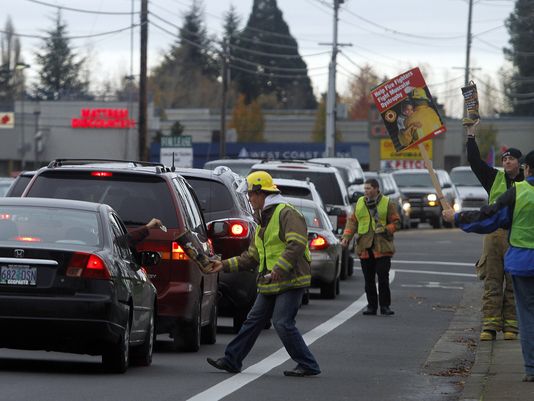 PA Governor Wolf signed new legislation last week (Act 57) which allows first responders to solicit donations at stop signs or traffic signals. Fire companies will need to get written permission from the local municipality and the solicitations are to drivers are limited to controlled intersections (stop signs or traffic signals) and are required to have the necessary liability insurance. The new law goes into effect within 60 days.
PA Governor Wolf signed new legislation last week (Act 57) which allows first responders to solicit donations at stop signs or traffic signals. Fire companies will need to get written permission from the local municipality and the solicitations are to drivers are limited to controlled intersections (stop signs or traffic signals) and are required to have the necessary liability insurance. The new law goes into effect within 60 days.
This new fundraising legislation may be a useful tool for some volunteer fire companies in Pennsylvania; particularly rural or areas suffering severe economic issues. But the question for Tredyffrin residents is whether we want to see our volunteer firefighters soliciting drivers on the side of the road as a way to fill budget gaps.
Representatives from fire companies (Berwyn, Paoli and Radnor) that serve Tredyffrin Township residents have repeatedly voiced concern about the increasing demand for fire and rescue services and the lack of reliable funding. As a result, T-E Fire Companies Funding Coalition comprised of fire companies from Berwyn, Paoli, Radnor and Malvern was formed with a mission to work with government officials to provide sustainable and adequate funding.
The ongoing need for recruitment and retention of volunteer first responders remains a concern. The time demands for volunteers are so severe, both fire-related and otherwise. Because people are spending more time on their ‘day’ jobs – there’s just less discretionary time to do anything else, including being a volunteer. For those who do manage to carve out time for serving as a volunteer firefighter, they want that time to be directed towards firefighting responsibilities not used for fundraising.
The cost to maintain a fire company; its building, equipment, training – continues to increase, with the cost of a new fire truck running in the tens of thousands of dollars. With the growth of both residential and commercial development in the area, the demand for fire and emergency service also continues to escalate.
According to the Berwyn Fire Company, less than 25 percent of fire service funding comes from the government. If the fire companies shuttered its doors, the township would still be responsible for providing fire protection. The old formula is no longer working … there is a need for sustainable funding.
Tis the season for budget discussion, including fire department funding – the Board of Supervisors meeting at 7 PM tongiht includes the ‘2016 Preliminary Budget and on Thursday, November 19, 10 AM – 12 PM, the public is invited to attend the Budget Open House at the township building.
Our volunteer firefighters should not be forced to close budget gaps with car washes, turkey raffles, spaghetti dinners or soliciting drivers on the side of the road. These young men and women need to know they can count on our elected officials to provide adequate and sustainable funding.
I couldn’t agree more Pattye. This roadside canning is begging plain and simple. Our townships have public safety as their primary responsibility. Let’s hope our elected leaders and the fire companies can come up with a long term strategic plan for funding that ensures our safety and respects these local heroes. We are all counting on you.
I think you are asking the wrong question. The question is why do fire departments have to do this in the first place? There should be a dedicated fire tax OR adequate funding from the township. Most people DO NOT give to the fire departments. The appeals received in the mail tend to go in the trash.
The sad fact is that most who complain the loudest about fire funding are the very ones who will complain about any tax increase to fund the departments.
Embarrassing country. Nothing is free.
I receive a contribution solicitation from Berwyn FC each year and do send a check. I agree that there should be some kind of taxable funding for fire prevention services.
Perhaps a “sir charge” to our township/county tax bill with these funds going directly to the fire companies, not the general funds that can be tapped by the other governing agencies.